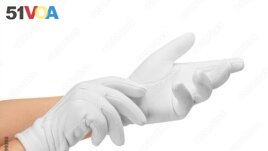And now, Words and Their Stories, from VOA Learning English.
On this program, we explore words and expressions in the English language. We give definitions, notes on usage, and use them in conversations.
Today we talk about a piece of clothing – gloves.

Kid gloves used to be worn by some servants to protect handling costly objects. (Adobe Stock Footage)
We wear gloves to protect our hands. When the weather is cold, we wear gloves to keep our hands warm. When we do difficult outdoor work, we might wear work gloves. And when we clean indoors, we might wear rubber gloves to protect our hands from chemicals.
But when do we wear "kid gloves"?
Kid gloves are made from the skin of a young goat, also called a kid. Kid leather is very soft. So, kid gloves are perfect for holding objects such as silverware and art without leaving fingerprints. Years ago, many servants would wear kid gloves.
But today, we use the expression kid gloves to describe a way of dealing with certain people or situations. People who are sensitive require kid gloves. And situations that are complex and delicate often need the kid-glove treatment.
However, when we use kid gloves to talk about people, it is a little different than when we talk about situations.
To treat something with kid gloves is to handle a situation carefully and with tact. When we do something tactfully, we do it in a thoughtful way. Tactful people deal with people and situations very well. They are diplomatic.
Handling a situation with kid gloves is the opposite of being a bull in a china shop. If you are a bull in a china shop, you handle a situation very carelessly. (We talked about this idiom on another Words and Their Stories.)
Kid-glove treatment shows special skill and sensitivity. People who need kid-glove treatment might be very sensitive, meaning their feelings are easily hurt. Or they might be fussy and demanding. For example, really famous actors or pop stars might need the kid-glove treatment.
Now, let's hear the idiom used in a conversation between two friends.
A: What are you doing this weekend?
B: An old friend is visiting me. We were best friends all through middle school and high school.
A: That sounds fun!
B: Well, I hope it will be.
A: Why do say ‘hope'?
B: Well, she just went through a very nasty divorce from her high school sweetheart. She's still very sensitive about it. So I have to handle her with kid gloves and not talk about our high school days.
A: Sounds like a little kid-glove treatment is just what she needs. And you can talk about the future instead.
And that's all the time we have for this Words and Their Stories. Until next time … I'm Anna Matteo.
Anna Matteo wrote this lesson for VOA Learning English.
_________________________________________________
Words in This Story
rubber –n. n elastic substance obtained from the milky juice of various tropical plants
sensitive –adj. easily hurt or damaged especially : easily hurt emotionally
delicate –adj. easily unsettled or upset : resulting from or requiring skill or careful treatment
tact –n. the ability to deal with others without upsetting them : tactfully –adv.
fussy –adj. easily upset : hard to please
nasty –adj. morally disgusting or degrading
